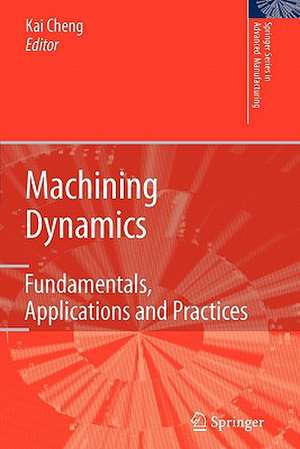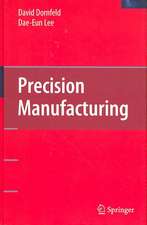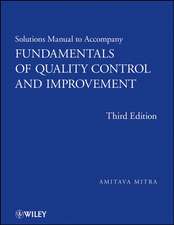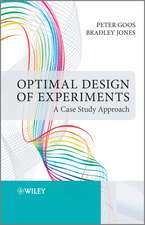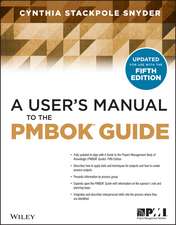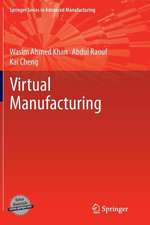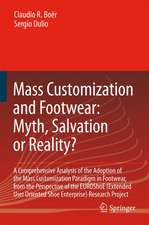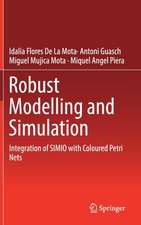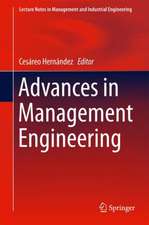Machining Dynamics: Fundamentals, Applications and Practices: Springer Series in Advanced Manufacturing
Editat de Kai Chengen Limba Engleză Paperback – 28 oct 2010
Written by experts in each field, this book discusses the state-of-the-art applications, practices and research in machining dynamics. Part 1 presents the basic theory, analysis and control methodology in addition to detailed modelling and diagnostic techniques, while Part 2 focuses on the applications of machining dynamics in machining processes such as turning, grinding, gear machining and non-traditional machining.
Advanced undergraduate and postgraduate students studying manufacturing engineering and machining technology will find this book a comprehensive introduction. Manufacturing engineers, production supervisors, planning and application engineers and designers will find it a useful reference.
| Toate formatele și edițiile | Preț | Express |
|---|---|---|
| Paperback (1) | 946.87 lei 6-8 săpt. | |
| SPRINGER LONDON – 28 oct 2010 | 946.87 lei 6-8 săpt. | |
| Hardback (1) | 953.03 lei 6-8 săpt. | |
| SPRINGER LONDON – 25 noi 2008 | 953.03 lei 6-8 săpt. |
Din seria Springer Series in Advanced Manufacturing
- 18%
 Preț: 1124.92 lei
Preț: 1124.92 lei - 18%
 Preț: 952.89 lei
Preț: 952.89 lei - 18%
 Preț: 1122.56 lei
Preț: 1122.56 lei - 17%
 Preț: 463.35 lei
Preț: 463.35 lei - 18%
 Preț: 1231.95 lei
Preț: 1231.95 lei - 15%
 Preț: 671.14 lei
Preț: 671.14 lei - 20%
 Preț: 691.51 lei
Preț: 691.51 lei - 18%
 Preț: 956.81 lei
Preț: 956.81 lei - 15%
 Preț: 632.37 lei
Preț: 632.37 lei - 20%
 Preț: 655.85 lei
Preț: 655.85 lei - 15%
 Preț: 636.94 lei
Preț: 636.94 lei - 18%
 Preț: 949.06 lei
Preț: 949.06 lei - 18%
 Preț: 1830.17 lei
Preț: 1830.17 lei - 19%
 Preț: 562.16 lei
Preț: 562.16 lei - 18%
 Preț: 1821.63 lei
Preț: 1821.63 lei - 18%
 Preț: 945.79 lei
Preț: 945.79 lei - 18%
 Preț: 949.10 lei
Preț: 949.10 lei - 18%
 Preț: 1552.01 lei
Preț: 1552.01 lei - 18%
 Preț: 1383.81 lei
Preț: 1383.81 lei - 18%
 Preț: 958.38 lei
Preț: 958.38 lei - 15%
 Preț: 639.25 lei
Preț: 639.25 lei - 18%
 Preț: 952.72 lei
Preț: 952.72 lei - 18%
 Preț: 945.79 lei
Preț: 945.79 lei - 15%
 Preț: 647.27 lei
Preț: 647.27 lei - 18%
 Preț: 945.92 lei
Preț: 945.92 lei - 18%
 Preț: 1215.99 lei
Preț: 1215.99 lei - 18%
 Preț: 1226.73 lei
Preț: 1226.73 lei - 18%
 Preț: 1840.43 lei
Preț: 1840.43 lei - 18%
 Preț: 1225.13 lei
Preț: 1225.13 lei - 18%
 Preț: 952.72 lei
Preț: 952.72 lei - 15%
 Preț: 634.68 lei
Preț: 634.68 lei - 15%
 Preț: 641.53 lei
Preț: 641.53 lei - 18%
 Preț: 947.35 lei
Preț: 947.35 lei - 18%
 Preț: 954.45 lei
Preț: 954.45 lei - 18%
 Preț: 951.77 lei
Preț: 951.77 lei - 15%
 Preț: 634.68 lei
Preț: 634.68 lei - 15%
 Preț: 636.94 lei
Preț: 636.94 lei - 18%
 Preț: 945.14 lei
Preț: 945.14 lei - 15%
 Preț: 638.89 lei
Preț: 638.89 lei - 18%
 Preț: 958.73 lei
Preț: 958.73 lei - 18%
 Preț: 1104.88 lei
Preț: 1104.88 lei - 18%
 Preț: 1226.73 lei
Preț: 1226.73 lei
Preț: 946.87 lei
Preț vechi: 1154.72 lei
-18% Nou
Puncte Express: 1420
Preț estimativ în valută:
181.19€ • 193.75$ • 151.07£
181.19€ • 193.75$ • 151.07£
Carte tipărită la comandă
Livrare economică 18 aprilie-02 mai
Preluare comenzi: 021 569.72.76
Specificații
ISBN-13: 9781849965897
ISBN-10: 1849965897
Pagini: 328
Ilustrații: XVIII, 328 p.
Dimensiuni: 155 x 235 x 18 mm
Greutate: 0.49 kg
Ediția:Softcover reprint of hardcover 1st ed. 2009
Editura: SPRINGER LONDON
Colecția Springer
Seria Springer Series in Advanced Manufacturing
Locul publicării:London, United Kingdom
ISBN-10: 1849965897
Pagini: 328
Ilustrații: XVIII, 328 p.
Dimensiuni: 155 x 235 x 18 mm
Greutate: 0.49 kg
Ediția:Softcover reprint of hardcover 1st ed. 2009
Editura: SPRINGER LONDON
Colecția Springer
Seria Springer Series in Advanced Manufacturing
Locul publicării:London, United Kingdom
Public țintă
ResearchCuprins
Basic Concepts and Theory.- Dynamic Analysis and Control.- Dynamics Diagnostics: Methods, Equipment and Analysis Tools.- Tool Design, Tool Wear and Tool Life.- Machining Dynamics in Turning Processes.- Machining Dynamics in Milling Processes.- Machining Dynamics in Grinding Processes.- Materials–induced Vibration in Single Point Diamond Turning.- Design of Precision Machines.
Recenzii
From the reviews:
[Machining Dynamics] can be used for final undergraduate engineering course (for example, manufacturing, mechanical, etc.) or as a subject on manufacturing at the postgraduate level. Also, this book can serve as a useful reference for academics, manufacturing researchers, mechanical and manufacturing engineers, professional in related industries with machine tools and machining processes.
Davim, J.P. (2009) ‘Machining Dynamics by Kai Cheng (Ed.)’, Int. J. Machining and Machinability of Materials.
"Machining dynamics is an important area for the advancement of national economies. … This book is the work of 16 authors. … This work can be used as an introduction to some of the science and engineering that lies at the foundation of the operation of these machine tools. Summing Up: Recommended. Upper-division undergraduates, graduate students, researchers, and faculty in manufacturing engineering." (A. M. Strauss, Choice, Vol. 46 (9), May, 2009)
[Machining Dynamics] can be used for final undergraduate engineering course (for example, manufacturing, mechanical, etc.) or as a subject on manufacturing at the postgraduate level. Also, this book can serve as a useful reference for academics, manufacturing researchers, mechanical and manufacturing engineers, professional in related industries with machine tools and machining processes.
Davim, J.P. (2009) ‘Machining Dynamics by Kai Cheng (Ed.)’, Int. J. Machining and Machinability of Materials.
"Machining dynamics is an important area for the advancement of national economies. … This book is the work of 16 authors. … This work can be used as an introduction to some of the science and engineering that lies at the foundation of the operation of these machine tools. Summing Up: Recommended. Upper-division undergraduates, graduate students, researchers, and faculty in manufacturing engineering." (A. M. Strauss, Choice, Vol. 46 (9), May, 2009)
Notă biografică
Professor Kai Cheng holds the chair professorship in Precision Engineering at Leeds Metropolitan University. His current research interests focus on the design of precision machines and instruments; nano-/micro-machining; machining dynamics and control; precision manufacturing; and digital manufacturing and enterprise technologies. Professor Cheng has published over 160 papers in international journals and refereed conferences, authored/edited four books and contributed six book chapters. He is Associate Editor (Europe) for Springer's International Journal of Advanced Manufacturing Technology.
His BEng (Hons) and MSc degrees were obtained from the Harbin Institute of Technology and he has a PhD from Liverpool John Moores University. He worked as a senior lecturer in Glasgow Caledonian University before joining Leeds Metropolitan University. Professor Cheng is a fellow of the IEE and the IMechE, and a member of the Euspen. He is the leader of the Advanced Manufacturing Technology Research Group, which is currently working on a number of research projects funded by the UK Research Councils, EU 6th Framework Program, KTP Program, DTI (UK), and the industry. The group has a record of international excellence in the areas of precision machine design, nano-/micro-machining and digital manufacturing.
His BEng (Hons) and MSc degrees were obtained from the Harbin Institute of Technology and he has a PhD from Liverpool John Moores University. He worked as a senior lecturer in Glasgow Caledonian University before joining Leeds Metropolitan University. Professor Cheng is a fellow of the IEE and the IMechE, and a member of the Euspen. He is the leader of the Advanced Manufacturing Technology Research Group, which is currently working on a number of research projects funded by the UK Research Councils, EU 6th Framework Program, KTP Program, DTI (UK), and the industry. The group has a record of international excellence in the areas of precision machine design, nano-/micro-machining and digital manufacturing.
Textul de pe ultima copertă
Machining dynamics play an essential role in the performance of machine tools and machining processes in manufacturing. Current advances in computational modelling, sensors, diagnostic equipment and analysis tools, 3D surface metrology and manufacturing science are giving researchers and practising engineers a new perspective on the machining process.
Machining Dynamics: Fundamentals, Applications and Practices reflects the new integrated approach to studying machining dynamics by presenting state-of-the-art applications, practices and research in the field. Written by experts in each field, the first part of the book presents the basic theory, analysis and control methodology in addition to detailed modelling and diagnostic techniques for machining dynamics, while part two focuses on applying the fundamentals of machining dynamics in a variety of machining processes including turning, grinding, gear machining and non-traditional machining.
Advanced undergraduate and postgraduate students studying manufacturing engineering and machining technology will find Machining Dynamics: Fundamentals, Applications and Practices a comprehensive and up-to-date introduction to the subject while the book’s thoroughness allows it to serve as a useful reference for manufacturing engineers, production supervisors, planning and application engineers and designers.
Machining Dynamics: Fundamentals, Applications and Practices reflects the new integrated approach to studying machining dynamics by presenting state-of-the-art applications, practices and research in the field. Written by experts in each field, the first part of the book presents the basic theory, analysis and control methodology in addition to detailed modelling and diagnostic techniques for machining dynamics, while part two focuses on applying the fundamentals of machining dynamics in a variety of machining processes including turning, grinding, gear machining and non-traditional machining.
Advanced undergraduate and postgraduate students studying manufacturing engineering and machining technology will find Machining Dynamics: Fundamentals, Applications and Practices a comprehensive and up-to-date introduction to the subject while the book’s thoroughness allows it to serve as a useful reference for manufacturing engineers, production supervisors, planning and application engineers and designers.
Caracteristici
Reflects the new integrated approach to studying machining dynamics by presenting the state-of-the-art applications, practices and research in this field Each chapter is written by a specialist in that particular field, with contributors spanning six countries and four continents Includes supplementary material: sn.pub/extras
